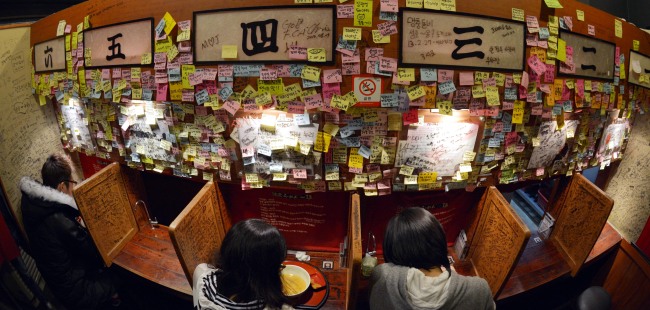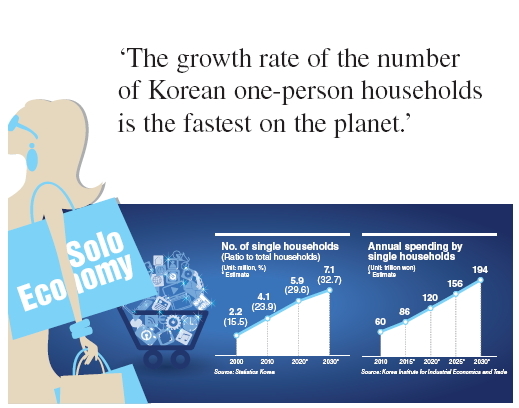Home alone
Shifting social trends see record number of single households
By Korea HeraldPublished : Nov. 22, 2013 - 20:49

The Roman emperor Augustus prohibited unmarried women between the ages of 20 and 50 from inheriting property because dying without legitimate children left properties heirless. Living alone in Ancient Rome was frowned upon by both state and citizenry.
After 2,000 years, prospects for those living alone have changed, although of course, not entirely for the better.
The modern day independent soul is sometimes known as a “singleton,” a one-person householder who voluntarily or involuntarily chooses to forfeit the comforts or discomforts of family life. The inclusive moniker inevitably includes unwilling singletons such as senior citizens who outlive their spouses, lonely divorcees in their 40s or 50s, and young job hunters living alone.
The trend is already prevalent in the United States (where 27 percent of households have a single occupant), Sweden (where over 2 million are solo dwellers in a country of 9.5 million) and Japan (over 30 percent).

Here in Korea, a record-high and ever increasing proportion of 23.89 percent of all households are one-person abodes. In fact, 23.8 percent of men and 18.9 percent of women in their 20s will stay single until 45 if the present trends continue, according to Lee Sang-lim of the Korea Institute for Health and Social Affairs.
“If the marriage rate of 2010 persists, one in four or five men and one in five or six women who are now in their 20s are expected to stay single,” said Lee.
A July study by Lee Eun-mi of the Samsung Economic Research Institute further posited that “the growth rate of the number of Korean one-person households is the fastest on the planet,” while by 2035, reported Statistics Korea, over one third, or over 7 million households in Korea, will be one-person homes.
Fundamental social changes that have rocked traditional Korean Confucian values have contributed to the rise in solo dwellers. Marriage, for example, is losing its status as an indispensable rite of passage among Koreans, especially women. In 2010, 39.4 percent of Seoul women thought they didn’t have to get married while 41.8 percent thought divorce was no longer a big no-no in Korean society. In the same year, 34 percent of Koreans over the age of 15 answered they were either indifferent to marriage or were outright against in a national survey conducted by Statistics Korea.
“I love the freedom in my life; the freedom to engage in hobbies, to develop myself. I went to China in 2011 for one year to learn the language. And after my work life ends, I plan to travel. That’s all I want in retirement,” said 46 year-old Kim Na-young, a 15-year veteran of the single life and divorcee living in Seoul.
“I see no particular reason to get married again.”
The rising divorce rate among even elderly couples, who have lived through times when divorce was an enormous social taboo in Korea, has also been a factor in the increase of singletons. In 1991, 978 senior couples divorced after having shared a home for more than two decades. By 2012, the figure had increased six-fold to 6,062.
But it’s not all about not getting married or getting a happy (or unhappy) divorce. Being a singleton means a lot more.
Leaving the bathroom door open while taking a shower, cooking in the kitchen naked, and taking the liberty to make the living room another bedroom are luxuries only some can enjoy.
“I think the most enjoyable part of living alone is that I don’t have to worry about the things other people in the home might say. I can leave the bathroom door open and I can sleep with only my underwear on,” said Han Se-sik, a 23 year-old college student living alone in Seoul.
David Song, a 34 year-old writer, told The Korea Herald his love for go-it-alone activities such as reading convinced him that going solo was the right thing to do.
“I’ve always been a ‘self-person’ so to speak, and perhaps that’s why I’ve never been that lonely living alone.”
Owning an exclusive living space, however, is not pure glamour, as may have been the case in Ancient Rome. Better healthcare means longer lives in the 21st century, which in turn implies that more spouses are sending off their lifelong partners to the next world and living alone for ten or twenty extra years.
In the most recent national census conducted in 2010, over 1.06 million senior citizens (or over 23 percent of all one-person households) over the age of 65 lived alone. By 2035, Statistics Korea estimates that 1.5 million men and women over 70 will be living in solitude.
Unlike many of their younger counterparts, though, aging singletons must cope with financial, healthcare, and psychological issues. Because close to 40 percent of current senior singletons never attended school while another 37.5 percent only attended elementary school, they face great difficulty finding jobs that will finance their daily lives. Not to mention the loneliness senior citizens can face as they live out their remaining days.
South Korea took the unenvied top spot in elderly suicides in the OECD in 2012 with 81.8 per 100,000 people between the ages of 65 and 74 taking their own lives, while a staggering 160 per 100,000 of those aged over 74 committed suicide.
Younger singletons have their own worries.
“When I get sick, there is no easy solution,” admitted Song, while Lee, a 36-year-old working female, said she worries about home robberies targeting single women like herself. “I pretend as best I can that there is someone else in the home when I order food, or meet a delivery guy at the front door.”
Kim Seo-hee, a 26 year-old female singleton living in Seoul, admitted there had been an occurrence in which an unknown male had followed her home.
“I have been scared many times while living alone. During nights, I get sensitive a lot and wake up at the slightest of sounds,” she said.
And then, there are the other implications of singledom Korea must face ― fewer babies, for instance.
“Even having children is considered a spec,” said Park Keong-suk, professor of sociology at Seoul National University, in reference to the overheated credential-focused job hunting environment for Korea’s 20-somethings.
“It’s not that everyone is avoiding marriage or trying out new lifestyles by living alone ... Living alone is rather one of the many by-products of today’s economic difficulties, insecure future and hardships in finding the right person to live with ... There are many who just simply give up trying to marry.”
Whatever the causes, fewer marriages mean fewer babies, contributing to an extremely low birth rate. Right now, Korea’s fertility rate stands at 1.3, a slight improvement from 2005 when it stood at 1.076. A declining birth rate would strain pension funds, to which younger generations must pay taxes, while at the same time aggravating manpower shortages in the private sector, the public sector, and even the military.
Park cautioned that Korea was ill-prepared for the increasing number of singles.
“I think it’s a paradox. Korea is still, at the moment, a communal society more or less. But there are increasing numbers of people who are feeling lonely, and increasing numbers of those who are trying to live it out alone, meaning more single households and a lower fertility rate” she said.
“But we aren’t prepared for this big change.”
By Chun Sung-woo, Jeong Hunny
(swchun@heraldcorp.com)
(hj257@heraldcorp.com)
-
Articles by Korea Herald











![[Hello India] Hyundai Motor vows to boost 'clean mobility' in India](http://res.heraldm.com/phpwas/restmb_idxmake.php?idx=644&simg=/content/image/2024/04/25/20240425050672_0.jpg&u=)








